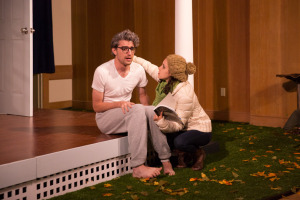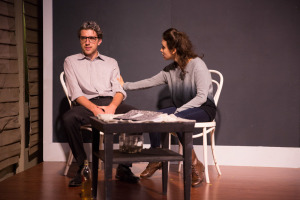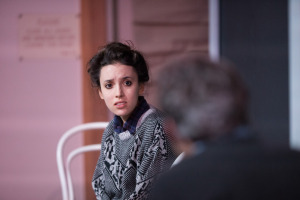
“There’s a fear that creativity peaks at age 23,” says Hal (Patrick James Lawhon) to Catherine (Jessica Waldman), the 25-year-old daughter of the now-deceased, famed mathematician, Robert (Matthew Libby), who made his greatest discoveries in his early 20s. Catherine deals with living in the shadow of her father’s success and grapples with his death, the world of academia and her own untapped potential in Stanford Theater Lab’s production of David Auburn’s Pulitzer-Prize winning play “Proof,” playing at the Elliot Programming Center until Nov. 15.
This production of “Proof” was supported by Stanford Arts Institute’s “Spark!” Grant and produced in conjunction with Psychology One – a natural partnership given the play’s psychological themes. The play’s emotional center, Catherine, is grappling with a lot of complicated issues. Is she destined to become her father, inheriting either his genius or mental instability – or both? Can she trust the people closest to her, like her domineering sister, Claire (Lucie Fleming) or Robert’s former student, Hal, who insists he loves Catherine but seems more interested in searching 103 notebooks Robert left behind? And did she write the groundbreaking proof that Hal found in one of Robert’s notebooks?

Director Noemi Ola Berkowitz eloquently explores questions of mental illness, creativity and family with a nuanced interpretation of Auburn’s brilliant text. Her blocking is thoughtful, and the powerful stage pictures she forms serve the arc of the story. For example, the other actors move around Catherine for much of the beginning of the play, demonstrating the profundity of her loss and her perceived lack of control in her life. Catherine begins to move more as the play progresses, demonstrating how she is regaining that control, and Jessica Waldman, who plays Catherine with adept emotional vulnerability, makes sure the audience moves with her. She delivers lines with skilled deadpan, making her contrasting emotional outbursts more powerful and explosive. Patrick James Lawhon plays a goofy, geeky and likeable Hal, earnestly conveying his amusement that his band (comprised of math geeks) has a song called “i” (or imaginary number), in which they “just stand there and play nothing for three minutes.”
“Several moments of humor pervade the weighty issues covered in the play. These mostly come from Lucie Fleming as Claire, who plays an exuberant foil to her brooding sister Catherine with charisma and skillful comedic timing. Costume designer Juliet Charnas adroitly accentuates their differences by putting Catherine in an oversized sweater and Claire in a showy scarf.
There are many moments of poignancy and depth amid these humorous bits, particularly in the relationship between Catherine and Robert. Matthew Libby plays Robert with a booming voice and slow gait, successfully portraying someone much older than himself. One of the most memorable parts of the show comes when Robert, on the cold porch outside his house, insists on showing a new proof to his daughter. The proof is a nonsensical rambling on the nature of cold: “Let X equal the cold. It is cold in December. The months of cold equal November through February.” Catherine sees the deteriorating state of her father’s mind and the fallibility of human thought, and suggests that they go inside, out of the cold.

Berkowitz crafts a palpable change in the tone of the scene following Catherine’s realization — Robert, who once carried himself with confidence and gestured expansively, now appears weak and vulnerable, a change that visibly affects Catherine. Berkowitz directs these moments with skill and ease, emphasizing the strong, emotional connection between Catherine and Robert.
Keenan Molner designed an impressive set that shows a realistic façade of Robert’s porch, complete with pillars, windows, a door and a section of a lawn. Sound designer Ouree Lee complements the show with a gentle soundscape, with sounds of rain and gentle music that help the show to flow fluidly from one scene to the next without overpowering the performance.
You do not want to miss this show. Berkowitz seamlessly brings together different elements of the production into a show that incites laughter, thought and cathartic emotion, and the actors deliver brilliant, nuanced performances that do justice to Auburn’s complex and multifaceted work.
“Proof“ runs Nov. 6-8 and 13-15 at 8 p.m. at the Elliot Program Center. Ticket reservations are closed, but additional tickets and a wait list are available at 7:15 p.m. each night before the show.
Noemi Berkowitz is the head theater critic for The Daily, but played no role in the writing, editing or publishing of this piece.
Contact Steve Rathje at srathje ‘at’ stanford.edu.
